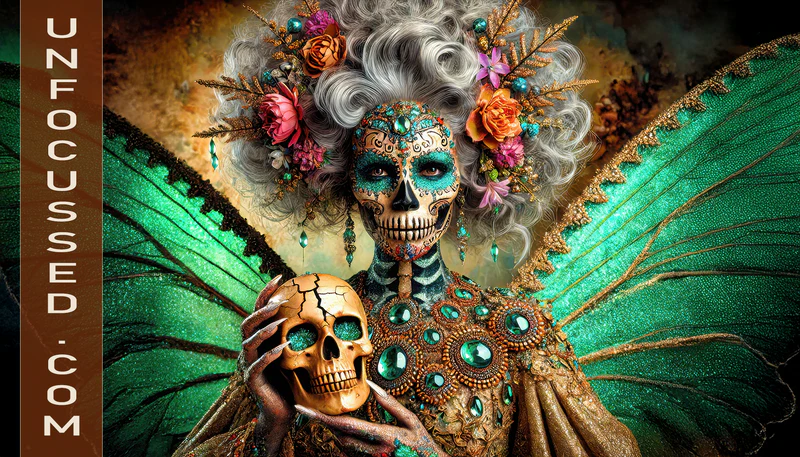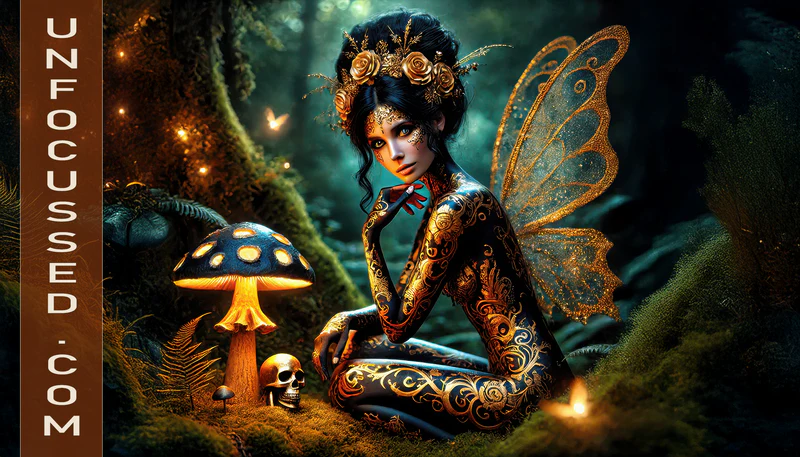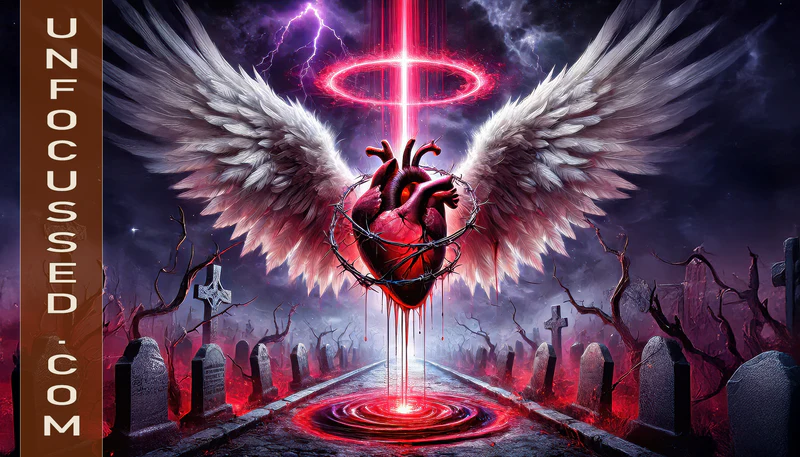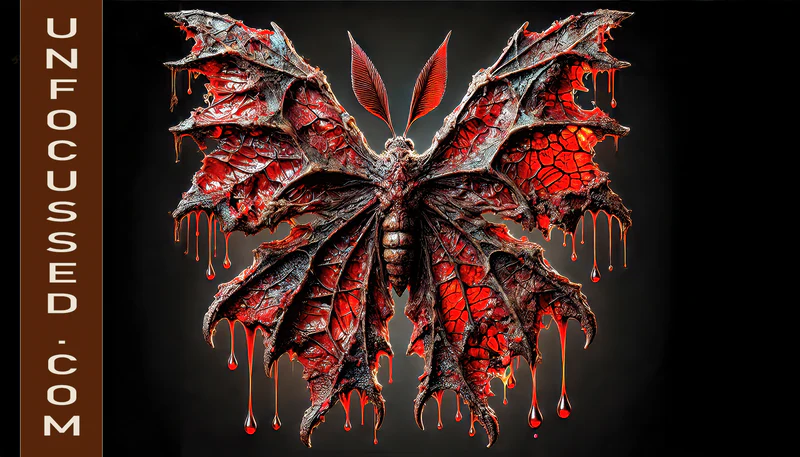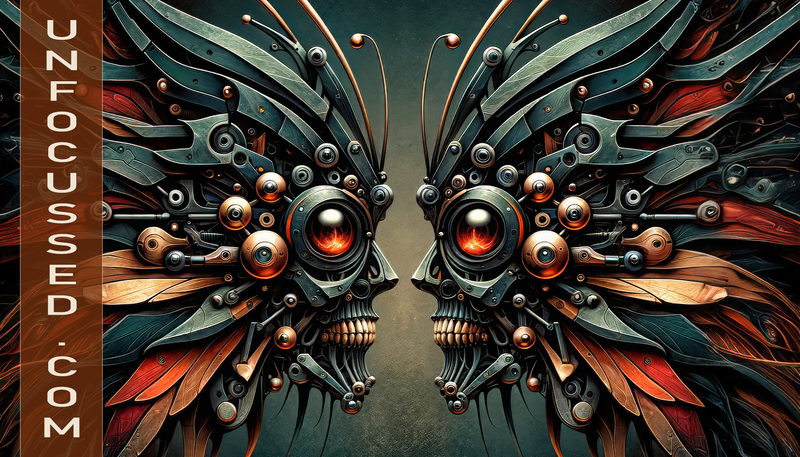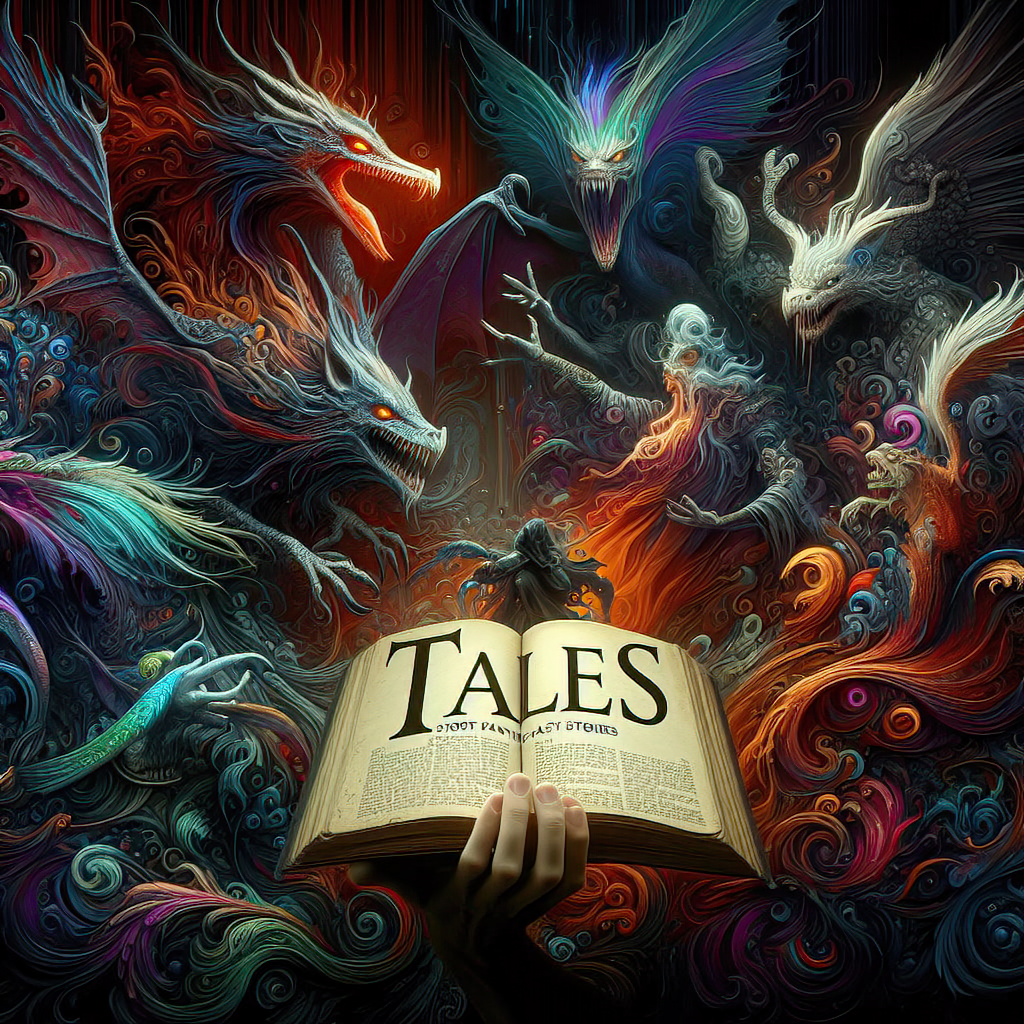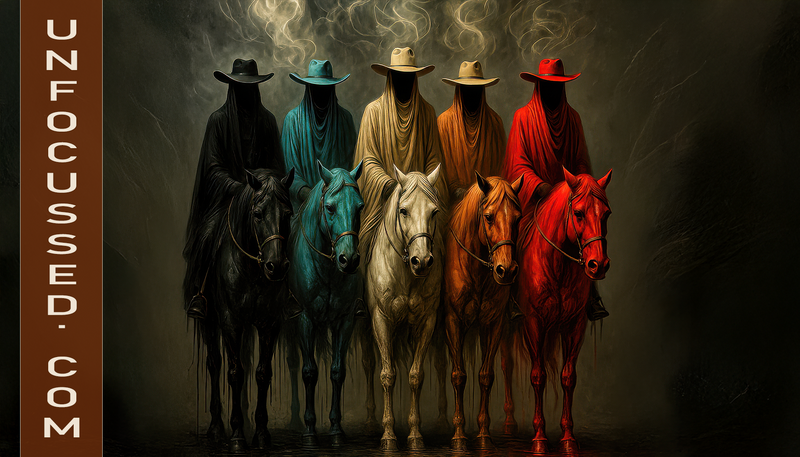
par Bill Tiepelman
Cavaliers du Voile Chromatique
Arrivée sous le voile La première fois que le voile s'est déchiré, ce n'était qu'un murmure. C'était la septième nuit consécutive sans lune — une nuit si anormalement sombre que même les loups avaient cessé de hurler, comme si le ciel lui-même avait oublié comment respirer. Quand cela se produisit, les villageois de Hollowvale n'entendirent pas le tonnerre, bien que les nuages tourbillonnèrent comme une tempête. Ils ne virent pas d'éclairs, bien que l'air crépitât comme assiégé. Ils entendirent plutôt des bruits de sabots. Cinq. Chacun distinct. Chacun délibéré. Chacun martelant un rythme comme une sentence de mort, se faisant plus fort à travers les champs de cendres et de terre desséchée. Personne ne quittait sa maison. Pas même pour jeter un coup d'œil. Les anciens se souvenaient. Et les anciens avaient peur. Le ciel s'ouvrit brusquement, juste au-delà de la lisière des bois desséchés, où rien n'avait poussé depuis deux récoltes. Là, encadrés par un horizon strié de fumée et de tristesse, cinq cavaliers émergèrent en formation parfaite. Ils chevauchaient fièrement des chevaux qui ne clignaient pas des yeux, ne hennissaient pas, ne bougeaient pas – comme sculptés dans la pierre vivante et l'ombre. La robe des chevaux scintillait de couleurs impossibles : obsidienne, ivoire, braise, bleu turquoise et rouge profond. Leurs cavaliers étaient drapés des mêmes teintes, chacun sans visage sous des capuches drapées qui bruissaient à chacun de leurs mouvements, bien qu'aucun vent ne soufflât. Et puis… ils s’arrêtèrent. Juste à la sortie du hameau. Ils observaient. Ils attendaient. Leurs couleurs ruisselaient sur le sol comme de l’huile, qui crépitait et brûlait là où elles tombaient. C'était la veille du jugement dernier . Personne ne prononça le nom à voix haute, mais tous le sentaient, comme un souvenir qui ne vous appartient pas encore, mais dont vous savez qu'il est vôtre. Les Cavaliers étaient déjà venus. Il y a des siècles. Toujours par groupes de cinq. Toujours durant les années où la terre s'asséchait et où les corbeaux s'engraissaient. Et toujours, ils venaient choisir . Ce qu'ils ont choisi, personne ne s'en souvient. Seulement, lorsqu'ils sont partis, le monde n'était plus le même. Cette fois, quelque chose était différent. Cette fois, un des cavaliers a bougé. Il – si c’était bien un homme – était drapé de pourpre. En descendant de cheval, la couleur de sa robe se répandit sur le sol comme une entaille dans la réalité. Ses bottes étaient silencieuses. Il ne tenait aucune arme, mais sa présence était la violence incarnée. Il fit un pas en avant, et le temps sembla se figer. Les nuages se déplacèrent violemment, comme s’ils se détournaient, honteux. Une porte s’ouvrit en grinçant dans une maison. Un enfant jeta un coup d’œil dehors. Le cavalier pourpre tourna la tête. Lentement. Délibérément. Et il sourit. Personne ne vit sa bouche, mais tous la sentirent. Ce sourire crispa le village et remonta le long de chaque nuque. C'est alors que les cris commencèrent. C'est alors que les gens se mirent à griffer leurs portes, suppliant les dieux, n'importe lesquels, même les mauvais, de les protéger de ce sourire qui n'était pas destiné aux mortels. Le cavalier cramoisi leva la main et désigna le clocher de l'église. Le clocher se brisa en deux et la cloche de fer s'écrasa au sol, s'enfonçant dans la terre comme une pierre tombale. Puis, aussi silencieusement qu'il était venu, le cavalier regagna sa monture. Et tous cinq se retournèrent d'un seul mouvement, disparaissant lentement dans la brume qui s'amoncelait derrière eux, telle de l'encre se dispersant dans l'eau. Au matin, le ciel était dégagé. Les oiseaux gazouillaient à tout rompre. Les enfants jouaient de nouveau. Le voile avait disparu. Mais l'église était toujours en ruines. Les traces de brûlures transparaissaient encore dans le sol, là où la couleur avait coulé. Et l'enfant qui avait ouvert la porte ? Elle avait disparu. Sans laisser de trace. Pas une empreinte. Pas un cri. Pas même de poussière. Seule une unique plume cramoisie, vibrante de chaleur, gisait à sa place. Signes dans la cendre et sang sur le vent La plume cramoisie ne se refroidit jamais. Il était conservé dans un bocal, scellé par sept anneaux de sel et veillé par la dernière Voyante du village, une femme borgne et sans ombre. Elle s'appelait Grendyl et ne parlait que par énigmes, à moins qu'on ne lui pose la bonne question. Ce matin-là, tandis qu'elle tenait le verre bourdonnant entre ses mains tremblantes, des larmes noires perlèrent de son œil unique. Elle ne dit rien. Elle hocha seulement la tête une fois et murmura : « Le Choix a commencé. » Les jours suivants, tout se dégrada, non seulement physiquement, mais aussi spirituellement. Le bétail refusa de s'alimenter. Les fruits des arbres pourrirent pendant la nuit. La femme du forgeron se réveilla en hurlant et en se griffant les bras, persuadée que des coléoptères avaient élu domicile sous sa peau. Personne ne put la convaincre du contraire, même lorsque le médecin tenta de la maîtriser, même lorsqu'elle se mordit le poignet. Elle mourut en fixant le plafond, souriant et murmurant : « Le voile est fin, le voile est fin, le voile est fin… » Trois autres personnes disparurent cette semaine-là. Toujours juste après le coucher du soleil. Toujours sans bruit ni lutte. D'abord un chasseur, puis un couple de jeunes mariés dont la cabane fut retrouvée intacte, à l'exception d'un cercle de cendres autour de leur lit et d'une tache de peinture indigo sur l'oreiller. Les villageois se réunirent à la lueur des torches dans les ruines de l'église. Leurs voix étaient étouffées, empreintes de suspicion et de peur. Ils discutaient de partir, de se cacher, de s'armer. Mais Grendyl arriva, la plume à la main, et la planta violemment sur l'autel. « Tu ne peux pas fuir ta couleur », siffla-t-elle. « Pas une fois que les Cavaliers t'ont marquée. Ils ne veulent pas de tes prières. Ils ne veulent pas de tes armes. Ils veulent ta vérité . » Silence. Puis, un jeune homme – Jerro, le fils du meunier – se leva. « Alors donnons-leur ce qui m’appartient », dit-il. « Qu’ils me prennent. Je n’ai plus rien. » Tous le regardèrent, stupéfaits et silencieux, sortir de l'église et se diriger vers le champ où les cavaliers étaient apparus pour la première fois. Grendyl ne l'arrêta pas. Elle murmura seulement : « Pauvre idiot. Ça ne marche pas comme ça. » Le lendemain matin, on retrouva le corps de Jerro dans le blé. Du moins, ce qu'il en restait. Il avait été fendu en deux, verticalement, comme disséqué par un scalpel manié par Dieu lui-même. Une moitié resta dans le champ. L'autre moitié était clouée à la porte de l'apothicairerie du village. À la place du sang, ses veines contenaient de la peinture. Une peinture épaisse, éclatante, scintillante, aux teintes indéfinissables. Son cœur avait disparu. Mais à sa place, il y avait un message, gravé dans le bois derrière lui : «Votre vérité n’a pas suffi.» Cette nuit-là, le cavalier turquoise est revenu. Il émergea de la brume peu après minuit, son cheval crachant une vapeur qui s'enroulait en serpentins. L'air autour de lui devint visqueux. Toutes les lampes du village s'éteignirent. Les rêves se muèrent en cauchemars – et tous ceux qui avaient un jour menti en dormant se réveillèrent en s'étouffant avec leur propre langue. Un homme s'embrasa. Un autre vieillit de cinquante ans en une nuit. Le chien du village se mit à parler à l'envers, prononçant les noms des morts en boitant sur la place, la queue entre les pattes. Cette fois, le cavalier turquoise ne s'approcha pas d'une maison. Il se dirigea vers la vieille école et posa une main sur sa porte. Le bâtiment trembla comme un être vivant. Des cris jaillirent de l'intérieur – des dizaines, bien que l'édifice fût abandonné depuis des décennies. La porte s'effondra en fumée. Les cris cessèrent. Et le cavalier turquoise, sans un autre geste, se fondit de nouveau dans la brume. Grendyl refusait désormais de parler, ne répondant que par monosyllabes. Sa main droite commença à peler, révélant de l'encre sous sa peau. Des lignes. Des symboles. Un langage que seuls les morts comprenaient. Elle se mit à les graver sur le plancher, murmurant « le cycle recommence », encore et encore, comme une prière pour personne. À la fin de la semaine, Hollowvale avait perdu 17 âmes. Toutes n'avaient pas été tuées. Certaines s'étaient simplement perdues dans les bois et n'étaient jamais revenues. D'autres avaient été retrouvées le regard perdu dans la rivière, la bouche grande ouverte, les yeux vides — de simples billes scintillantes de peinture tourbillonnante, encore fraîches. Puis vint le cavalier d'ivoire. Il était différent. Plus lent. Il ne brûlait pas. Il glaçait. Sa présence vidait le monde de toute couleur. Les fleurs se fanaient en une poudre grise à son passage. Le bois craquait. Les vitres se couvraient de givre. Et ceux qui le regardaient droit dans les yeux étaient frappés d'un silence glacial dont ils ne se remettaient jamais. Des familles entières restaient immobiles dans leurs cours, figées, immobiles, immobiles — jusqu'à ce qu'elles se réduisent en poussière comme des statues balayées par le givre et caressées par le vent. Seule Grendyl semblait indifférente. Assise sur la place, elle griffonnait frénétiquement, fredonnant une complainte sans mélodie. La plume flottait devant elle, vibrant au rythme des sabots des Cavaliers, aussi loin qu'ils paraissaient. Elle comptait quelque chose. Pas des jours. Pas des morts. Elle comptait des mensonges. Car c'est de cela que se nourrissaient les Cavaliers. Les mensonges que nous nous sommes racontés. Celles qui parlent de sécurité. De dieux. De qui nous étions avant que le voile ne se fissure. Avant que les Cavaliers ne reviennent nous rappeler les vérités que nous avions enfouies trop profondément. Hollowvale n'était pas innocente. Elle avait été choisie . Et quelqu'un parmi eux avait invoqué le Voile. Non par la prière. Non par la magie. Mais par le secret. Quelqu'un avait conclu un pacte. Et les Cavaliers étaient venus récupérer leur dû. Le pacte, le prix et l'horizon pâle La vérité n'a pas été révélée en douceur. Elle s'ouvrit comme un cercueil qu'on aurait donné un coup de pied de l'intérieur. Elle se répandit sur Hollowvale une dernière nuit, lorsque le ciel au-dessus des bois s'embrasa et que les deux derniers Cavaliers émergèrent : l'Obsidienne et l'Ambre. Cette fois, ils se sont réunis. Ils ne se sont pas arrêtés au champ. Ils n'ont pas observé. Ils sont entrés à Hollowvale. Les portes s'ouvraient toutes seules. Les murs laissaient suinter du vernis. Chaque surface réfléchissante, des flaques d'eau aux miroirs, ne reflétait pas le présent, mais des souvenirs. Des traumatismes. Des péchés. Une femme s'effondra à genoux en voyant son reflet avouer un meurtre dont personne n'avait connaissance. Un enfant hurla tandis que son propre visage articulait les mots : « Je l'ai laissé se noyer. » Même les chiens hurlaient d'une voix humaine. Les Cavaliers traversèrent tout cela en silence. Leurs chevaux glissaient plutôt qu'ils ne trottaient. Celui d'Obsidienne ne projetait aucune ombre, et les sabots de celui d'Ambre résonnaient comme des cloches lors d'un cortège funèbre. Et entre eux, flottant comme un morceau d'étoffe brûlée sur des fils invisibles, apparut le Voile . Ce n'était pas une métaphore. C'était réel. Un lambeau déchiré d'une matière ni tout à fait tissu, ni tout à fait légère — plus sombre que la nuit, mais plus éclatante que la mort. Elle palpitait comme un cœur et vibrait du poids de mille serments tus. Et lorsqu'il atteignit la place, il s'arrêta au-dessus de Grendyl. Elle leva les yeux pour la première fois depuis des jours, les lèvres gercées et sèches, les yeux cernés d'encre. La plume flottante planait au-dessus de son cœur. Les lignes sur ses bras formaient désormais une carte – une carte des secrets de Hollowvale, gravés à même sa peau. Elle rit. Non pas le rire de la victoire, mais le rire désespéré et brisé de celle qui croyait encore avoir le temps. « Ce n'était pas censé être moi », a-t-elle dit. Le cavalier d'obsidienne parla. Un seul mot, et le sol en trembla. "Mensonge." La cavalière d'ambre leva la main. Le Voile descendit. Il effleura la tête de Grendyl comme une couronne. Elle se cambra en arrière, poussant un cri si rauque qu'il fit s'abattre les corbeaux du ciel. Ses souvenirs se déversèrent dans le Voile. Un à un. Nous les avons vus. Grendyl enfant, murmurant des malédictions aux ossements d'un prêtre noyé. Grendyl lors d'un rituel nocturne avec un cercle de villageois vêtus de robes, citant des noms et promettant des faveurs. Grendyl, dont le sang s'infiltrait dans le sol sous la chapelle, concluait un pacte avec quelque chose sans visage mais aux multiples bouches. Grendyl, tenant une pierre rouge, psalmodiait, invoquant les Cavaliers pour qu'ils consument sa culpabilité… en faisant payer son prix aux autres. Le Voile siffla. Non pas de colère, mais de compréhension. Il l'enveloppa entièrement. Son corps disparut. Ses cris, eux, persistèrent. Ils ne l'ont toujours pas fait. Puis — les Cavaliers se tournèrent vers le village. Le reste du village. Non pas pour détruire, mais pour choisir . Chaque homme, femme et enfant était paralysé sur place. Non par magie, mais par la vérité. Quand les Cavaliers vous regardaient, vous vous souveniez de tout ce que vous aviez caché. Et vous le sentiez. Au plus profond de vous-même. Dans votre souffle. Comme si votre vie se réécrivait. Chaque Cavalier traversait la foule. Ils posaient leurs mains sur les fronts, sur les cœurs, sur des mains tremblantes. Ils ne tuaient pas. Ils recueillaient. Certains s'effondrèrent sur place, le corps intact, mais le regard vide. Tout ce qui les rendait humains avait disparu . D'autres pleuraient et tombaient à genoux, implorant le pardon pour des crimes qu'ils ne s'étaient même pas avoués. Quelques-uns, très peu, restèrent indemnes. Non pas purs, mais sincères. Sincères dans leur peur, dans leurs regrets, dans leur faiblesse. Le Voile les épargna. Les Cavaliers s'inclinèrent devant eux. Et puis le ciel s'ouvrit une dernière fois. Les couleurs qui jaillirent n'étaient pas des couleurs connues. C'étaient des émotions rendues visibles : un chagrin aux teintes métalliques, une joie qui résonnait comme une musique. Les cinq Cavaliers retournèrent dans la brèche céleste, suivis du Voile, traînant derrière eux comme une rivière aspirée par la terre. Avant que la brèche ne se referme, le Cavalier d'Obsidienne se retourna une dernière fois… et laissa tomber quelque chose dans le sol. Un miroir. Elle repose toujours au cœur de Hollowvale. Intacte. Car personne ne souhaite se voir comme les Cavaliers l'ont vu. Les survivants ont reconstruit. Lentement. Silencieusement. Avec moins de mensonges. Mais ils n'ont jamais enlevé le miroir. Ils n'ont rien planté près de lui. Aucun enfant ne naît près de lui. Et chaque nuit, une bougie est allumée à côté. Non pas pour empêcher quoi que ce soit d'entrer . Mais pour être sûrs qu'ils se souviennent de ce qu'ils ont laissé entrer. Des années plus tard, un voyageur demanda à un vieil homme aveugle assis près du miroir : « Qu'étaient-ils vraiment ? Des esprits ? Des dieux ? » Le vieil homme ne répondit pas tout de suite. Il plongea la main dans son manteau et en sortit une plume — cramoisie, encore chaude au toucher. « Ils étaient notre vérité », a-t-il dit. « Et c'est la chose la plus terrifiante qui ait jamais surgi des ténèbres. » Si les Cavaliers ont envahi votre imagination et refusent de vous quitter, vous pouvez désormais insuffler une part de cette énergie inquiétante à votre propre univers. « Cavaliers du Voile Chromatique » est disponible sous forme d'une impression sur bois d'une vivacité saisissante ou d'une impression sur métal aux reflets éclatants, idéale pour sublimer votre côté obscur de la manière la plus saisissante qui soit. Vous préférez une expérience plus tactile ? Mettez votre patience à l'épreuve avec le puzzle de 1 000 pièces et percez vous-même le mystère. Ou emportez les ombres partout avec vous grâce à un élégant sac fourre-tout empreint de mystère. Laissez l'histoire vivre au-delà de l'écran. Appropriez-vous le voile. Touchez le mythe. Osez donner forme à votre vérité.








